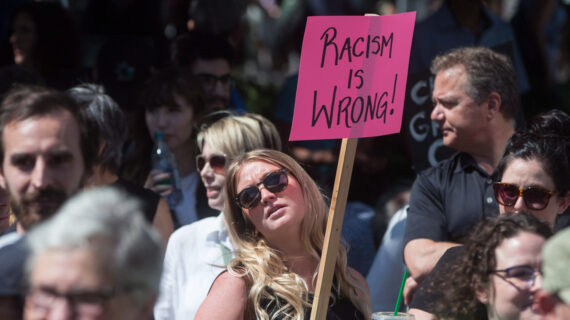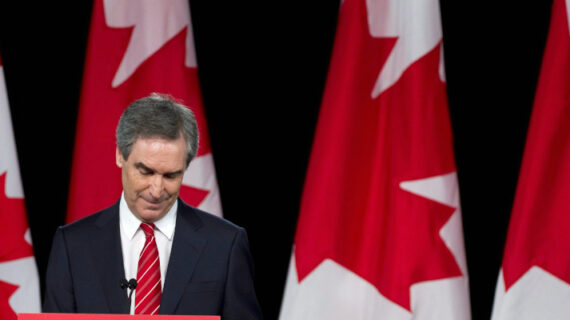The deadline for mail-in ballots in the United Conservative Party leadership race was Monday, meaning that Alberta’s next premier has likely already been chosen. All that remains is to count the votes on Thursday evening and find out who it is.
Although the betting favourite is former radio host Danielle Smith, the contest goes beyond the individuals running to lead the UCP and has broken down along old fault lines in the conservative movement.
As former leader of the Wildrose Party, Smith is the standard bearer for the grassroots members and she’s fighting an old grudge against the Progressive Conservative wing of the party, which leans a little more moderate and institutionalist.
Although the two parties merged in 2017, the divisions remained and were at least partly responsible for the ouster of Premier Jason Kenney, whose resignation sparked the leadership race.
“No other party has this sort of infighting, no conservative leader has survived a term in office since Ralph Klein in 2000,” says Duane Bratt, a political scientist at Mount Royal University.
Karamveer Lalh, a former UCP staffer and Hub contributor, believes the divide still lives but manifests in different ways.
“I think currently the main divide within the party is more of a pro-establishment, read pro-Kenney, versus anti-establishment,” says Lalh. “There’s a correlation between the PCs and Wildrose in those two camps, respectively.”
Of the candidates running, Bratt says a few carry some characteristics of the defunct PCs and its appeal to urban Alberta, especially Travis Toews. Kenney’s former finance minister, Toews has also served on the boards of several corporations and represented Canada on international trade committees before entering politics.
“He’s the establishment candidate, he’s the one who works with big business,” says Bratt.
Despite his work in the corporate world, Toews is also a rancher from rural Alberta. Bratt sees him as someone who can bridge the gap between rural and urban Alberta, an opinion shared by the candidate himself.
“I’m comfortable in downtown Edmonton and Calgary for sure, but my roots are planted deep in rural Alberta,” Toews told The Hub in an exclusive interview.
Bratt sees the leadership election as rural Alberta’s opportunity to finally take control of the UCP and govern Alberta. Although he says some rural supporters have lined up behind Toews, others are backing Smith.
Smith, a former journalist, radio host, and Wildrose leader, re-entered politics last March with the intention of leading the UCP. Her campaign is centred around radically increasing Alberta’s autonomy from Ottawa, more so than any other Alberta premier has ever before.
With a federal Liberal government determined to levy carbon taxes and place more restrictions on the province’s energy-dominated economy, tensions between Alberta and Ottawa are red-hot.
Every candidate in the race has promised to stand up to Ottawa, but Smith has gone the furthest by proposing the Alberta Sovereignty Act. The controversial law would supposedly allow Alberta to refuse to enforce any federal policy that threatens Alberta’s interests or provincial rights. Legal analysts have called it unworkable and unconstitutional.
Yet Smith, with her insistence on unprecedented autonomy for Alberta, has outpolled Toews and former Wildrose leader Brian Jean, who is also running, among UCP members.
“Smith has attracted some Wildrose supporters, but also people even further Right. Some who have never voted before,” says Bratt.
However, polling of the broader public suggests most Albertans have little enthusiasm for the Alberta Sovereignty Act, which Smith promises to introduce immediately if she becomes premier. Bratt says the UCP’s appeal, which Toews acknowledges is already smaller than the PC tent was at different times in recent history, is likely to shrink further if Smith wins.
“I suspect that regardless of who wins the leadership, the UCP will win a reduced majority government in Spring 2023,” says Lalh.
There were warning signs even in the early days of the UCP that the marriage could be rocky. Kenney became the UCP’s inaugural leader in 2017 in a battle against Jean.
Kenney was also the last leader of the PCs, who had previously governed Alberta continuously from 1971 to 2015 as a moderate, big-tent party that leaned broadly centre-right. The PCs were also historically known for defending Alberta’s provincial rights against federal encroachment.
Most notably, PC Premier Peter Lougheed (1971-1985) strongly opposed Ottawa’s National Energy Program (NEP), which enabled the federal government to regulate the supply and price of Alberta’s lavish oil and gas exports. The NEP created intergenerational bitterness between Alberta and Ottawa that continues to be felt.
Rural ridings were the PC’s electoral backbone, while the leadership’s moderate attitude also made it attractive to urban and suburban voters. Lougheed himself represented a Calgary riding, and nearly all of Lougheed’s successors represented ridings in Calgary or Edmonton.
From 1971 to 2015, the formula worked. However, the PCs had to contend with growing frustration from rural constituents that eventually bubbled over.
There were many reasons for this, including the party’s often heavy-handed approach to governing, particularly in the energy sector, and the mostly urban leadership’s comfortable relationship with “Big Oil” in downtown Calgary.
It resulted in the emergence of the rural-based Wildrose Party, a far more ideologically conservative party that drew support from the disgruntled PC base in rural Alberta. In the 2015 provincial election, the Brian Jean-led Wildrose’s popularity overtook the PCs. The result was a New Democratic Party (NDP) victory, with only 41 percent of the vote, while the PCs and Wildrose split 52 percent between them.
Much of rural Alberta was in the Wildrose’s hands, and the PCs were reduced to a rump with nine seats, mostly in suburban Calgary. Jason Kenney soon emerged from Ottawa to take over the PCs and initiated the merger with Wildrose within months.
A committed economic and social conservative, Kenney’s convictions were at odds with the typically moderate PC approach.
“I don’t believe he (Kenney) was ever a PC’er,” says Bratt. “When you look at Kenney’s ideological convictions, he was a much better fit with the Wildrose Party.”
After defeating Jean in the inaugural UCP leadership race, Kenney led the UCP to power, winning a large majority of seats in the 2019 provincial election.
Nonetheless, Kenney was criticized by Jean for governing in a top-down manner that still bothered many grassroots supporters. Bratt says the dissatisfaction began with Kenney winning the UCP leadership, and his cabinet decisions soon thereafter.
“The only reason he won a majority was rural seats where he won 39 out of 41 of them, and put basically every MLA from Calgary in his cabinet and left out rural Alberta,” says Bratt.
Jean also blames Kenney’s cabinet decisions for the UCP’s continued infighting.
“I think that’s why we’re in the position we’re in right now,” says Jean. “I thought it was a very poor job of making sure each part of Alberta felt represented.”
Dissatisfaction with Kenney only increased with his handling of the pandemic, resulting in a leadership review last May. Although Kenney won by 51 to 48 percent, the narrow margin resulted in his resignation and the start of its current leadership race.
The UCP leadership race concludes on October 6.




